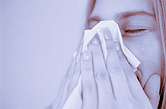
THURSDAY, Jan. 9, 2014 (HealthDay News) — Exercising when you have a cold or the flu can cause more harm than good in some cases, an expert warns.
U.S. health officials recently reported widespread flu activity in 25 states.
“Depending on where a person experiences symptoms of illness can make or break his or her workout and recovery,” Karin Richards, acting chair of the kinesiology department at University of the Sciences in Philadelphia, said in a university news release.
“For instance, those who experience above-the-neck symptoms such as stuffy noses and sneezing are generally fine to continue their exercise routine,” she explained. “However, those with symptoms below the neck, such as a fever, nausea and muscle aches, are urged to stay in bed and recover.”
If you have the flu, you need to avoid exercise and stay home from fitness centers so that you don’t spread the virus to others, she said. If you have minor cold symptoms, you can still exercise but should lower the intensity of your regular workout. For example, if you typically run, switch to walking, she suggested.
“There is a fine line between a minor cold and the flu, and it’s important for individuals to stay in tune with their bodies,” Richards said. “A person’s body is stressed when fighting the infection, so placing additional stress through intense exercise only suppresses the immune system even more.”
Exercise at home or outdoors until your symptoms disappear. If you do go to the gym, avoid sneezing and coughing on workout equipment, she noted.
Sometimes, yoga and gentle stretches can make you feel better and relieve congestion and pressure, said Richards.
Although halting your exercise program while you’re sick may seem like a major setback, most people are able to return to their workout routines fairly quickly once they’ve fully recovered, she added.
“Of course, individuals are encouraged to seek the advice of their primary care physician or a health care professional if they have any questions regarding continuation or resumption of their exercise routine if they are sick,” Richards said.
More information
The American Academy of Family Physicians has more about colds and the flu.
Copyright © 2025 HealthDay. All rights reserved.

